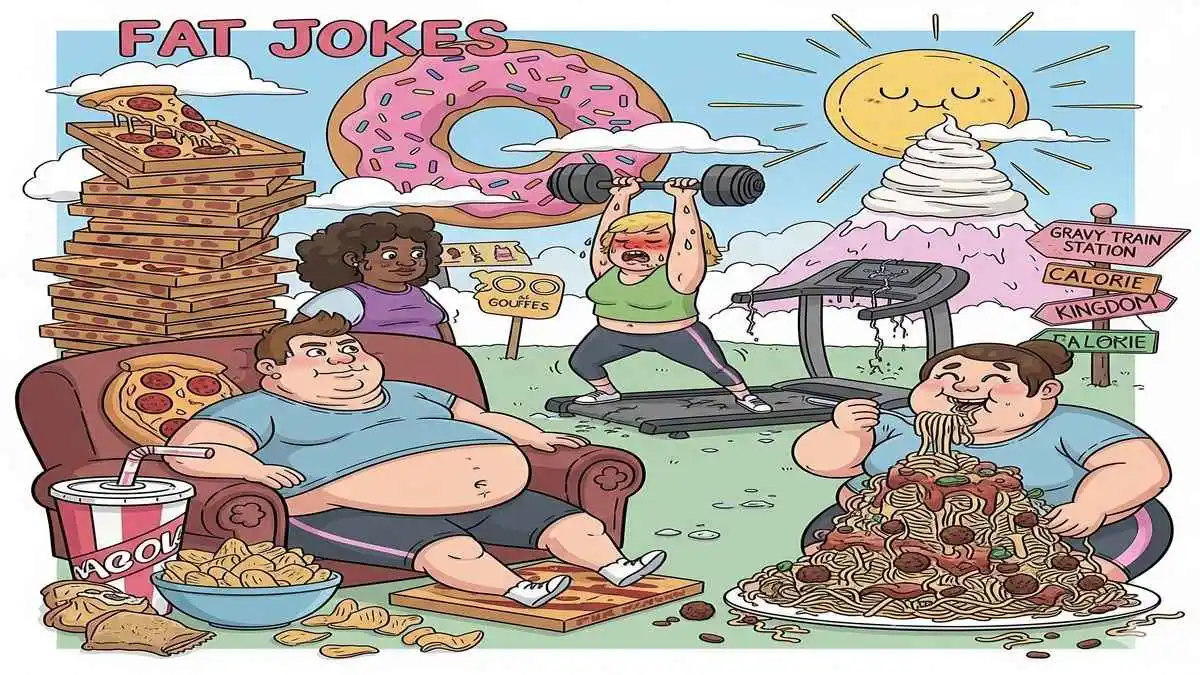GENERAL
Fat Jokes: Why They Are Harmful and Not Harmless Fun

Quick Answer
Fat jokes are jokes or remarks that make fun of a person’s body size or weight, often by exaggerating stereotypes about being lazy, unhealthy, or lacking self-control.
Introduction
I’ve often heard people dismiss fat jokes as “just humor” or “not a big deal,” but the reality is far more complex. These jokes might seem casual or funny in the moment, but they carry significant consequences. They tap into deep-seated stereotypes about weight and health, affecting not just the person being joked about but society’s broader views on body image.
Table of Contents
What Are Fat Jokes?
Fat jokes are remarks or punchlines that mock or ridicule someone’s weight, appearance, or eating habits. They usually rely on common stereotypes such as:
- Overweight people are being lazy or unmotivated
- Larger bodies representing poor health
- Equating self-worth with body size
While some people deliver these jokes casually among friends, they are part of a larger cultural pattern known as body-shaming. Even when told without malicious intent, they still reinforce the idea that certain bodies are inferior.
The Problem with “Just Joking”
Humor has power; it shapes how we think and feel. When fat jokes are dismissed as harmless, they normalize disrespect toward people based on appearance. According to the American Psychological Association (APA), repeated exposure to weight-related stigma can lead to long-term psychological harm, including anxiety, depression, and eating disorders (APA, 2020).
The phrase “just joking” often masks a deeper issue: these jokes reflect societal prejudices. By laughing at them, we unintentionally validate stereotypes and make it harder for individuals to feel accepted in their own bodies.
Psychological Impact of Fat Jokes
The personal toll of fat jokes is significant. Research shows that people exposed to weight-related teasing are more likely to experience:
- Low self-esteem: Constant ridicule chips away at one’s confidence.
- Social anxiety: Fear of being mocked can cause people to withdraw.
- Disordered eating: Some cope through unhealthy eating habits, either overeating or extreme dieting.
- Depression: Persistent teasing can worsen or trigger mental health struggles.
A 2017 study published in Obesity Reviews highlighted that weight stigma, often fueled by humor, is directly associated with poorer mental and physical health outcomes (Puhl & Suh, 2017).
Societal Consequences
Fat jokes don’t just harm individuals; they also reinforce systemic discrimination. In workplaces, schools, and healthcare settings, people in larger bodies already face bias. Humor that makes fun of weight legitimizes this bias.
For example:
- In schools, students teased for their size are at higher risk of bullying and academic disengagement.
- In workplaces, weight stigma can influence hiring decisions, promotions, and workplace culture.
- In healthcare, doctors sometimes dismiss patients’ concerns, assuming all health issues are weight-related.
This cycle reveals that such jokes are not isolated; they are part of a broader culture that devalues people based on their size.
The Link Between Humor and Body-Shaming
Humor can be a powerful tool for bonding, but it can also exclude. Fat jokes fall under the category of disparagement humor, which psychologists define as jokes that target marginalized groups.
According to Thomas E. Ford, a professor of psychology at Western Carolina University, disparagement humor creates “normative permission” to express prejudice (Ford & Ferguson, 2004). In simple terms, laughing at fat jokes gives others the green light to continue stigmatizing body size.
Why People Tell Fat Jokes
It’s worth asking: why do people still tell fat jokes when the harm is so clear? A few reasons stand out:
- Cultural conditioning: For decades, media and entertainment have relied on overweight characters as comic relief.
- Deflection: Some people use humor to mask their own insecurities about body image.
- Lack of awareness: Many genuinely believe it’s harmless, not realizing the deeper impact.

Toward More Respectful Humor
Humor doesn’t have to come at someone else’s expense. There are healthier, more inclusive ways to be funny:
- Self-deprecating humor (without body-shaming): Joking about one’s quirks or habits without reinforcing harmful stereotypes.
- Observational humor: Finding humor in everyday life experiences.
- Satire: Challenging social norms or power structures instead of mocking individuals.
By shifting the focus, we preserve the joy of laughter while avoiding harm.
Building a Culture of Inclusivity
Ending fat jokes is not about policing humor; it’s about fostering respect. Here are a few steps we can take collectively:
- Challenge stereotypes: Speak up when jokes reinforce harmful ideas.
- Educate ourselves: Learn about the psychological and health impacts of weight stigma.
- Support media diversity: Encourage stories and characters that portray body size realistically and positively.
- Practice empathy: Remember that we rarely know someone’s health, history, or struggles just by looking at them.
As society works toward inclusivity, rejecting such jokes is one meaningful step in dismantling body-shaming.
FAQs
1. Are fat jokes considered a form of bullying?
Yes, fat jokes fall under verbal bullying because they target and ridicule someone’s appearance.
2. Can fat jokes affect children differently than adults?
Yes, children are especially vulnerable as early exposure can shape their self-image and social confidence.
3. Do fat jokes only harm the person targeted?
No, they also reinforce negative stereotypes in society, influencing how others view and treat people of larger body sizes.
Conclusion
Fat jokes might appear to be lighthearted, but their impact is anything but. They perpetuate harmful stereotypes, damage self-esteem, and reinforce systemic discrimination. When we excuse them as “just humor,” we overlook their role in shaping societal attitudes about body size.
I believe humor should unite us, not divide us. By moving away from fat jokes and embracing more thoughtful humor, we can create a culture that values respect, inclusivity, and empathy. After all, laughter is most powerful when it uplifts, rather than tearing down.
-

 GENERAL7 months ago
GENERAL7 months agoChristofle – For Those Who Dream of Family Heirloom Silver
-

 SPORTS9 months ago
SPORTS9 months agoDiscover the World of Football with Streameast: Watch Your Favorite Leagues and Tournaments
-

 GENERAL1 month ago
GENERAL1 month agoUncovering the World of кинокрадко: The Dark Side of Film Piracy
-

 GENERAL4 months ago
GENERAL4 months agoATFBooru: Anime, Gaming, and Subculture Imageboard























